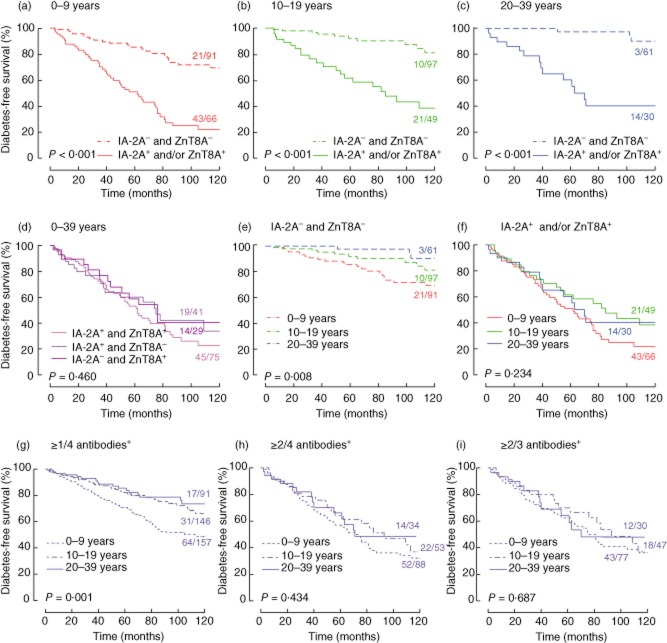Fig. 1.
Diabetes-free survival of persistently antibody-positive relatives as a function of time after first antibody-positive sample. (a) Age group 0–9 years: insulinoma antigen 2A (IA-2A)– and zinc transporter 8 autoantibodies (ZnT8A)– relatives (n = 91 at time 0) versus IA-2A+ and/or ZnT8A+ relatives (n = 66 at time 0). (b) Age group 10–19 years: IA-2A– and ZnT8A– relatives (n = 97 at time 0) versus IA-2A+ and/or ZnT8A+ relatives (n = 49 at time 0). (c) Age group 20–39 years: IA-2A– and ZnT8A– relatives (n = 61 at time 0) versus IA-2A+ and/or ZnT8A+ relatives (n = 30 at time 0). (d) Age group 0–39 years: IA-2A+ and ZnT8A+ relatives (n = 75 at time 0) versus IA-2A+ and ZnT8A– relatives (n = 41 at time 0) versus IA-2A– and/or ZnT8A+ relatives (n = 29 at time 0). (e) IA-2A– and ZnT8A– relatives: 0–9 years versus 10–19 years versus 20–39 years. (f) IA-2A+ and/or ZnT8A+ relatives: 0–9 years versus 10–19 years versus 20–39 years. (g) Relatives positive for ≥1 antibody among insulin autoantibodies (IAA), glutamate decarboxylase autoantibodies (GADA), IA-2A and ZnT8A: 0–9 years versus 10–19 years versus 20–39 years. (h) Relatives positive for ≥2 antibodies among IAA, GADA, IA-2A and ZnT8A: 0–9 years versus 10–19 years versus 20–39 years. (i) Relatives positive for ≥2 antibodies among IAA, GADA and IA-2A: 0–9 years versus 10–19 years versus 20–39 years. P-values by log-rank test. The fraction of relatives progressing to diabetes during follow-up is indicated above each arm in the nine panels.

